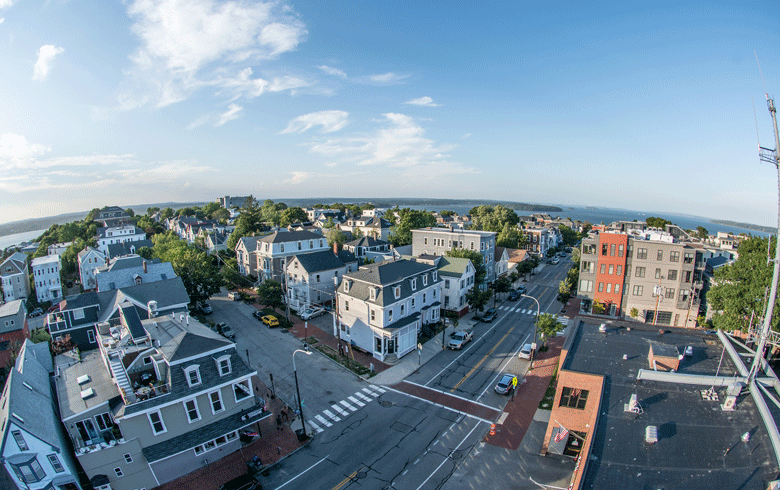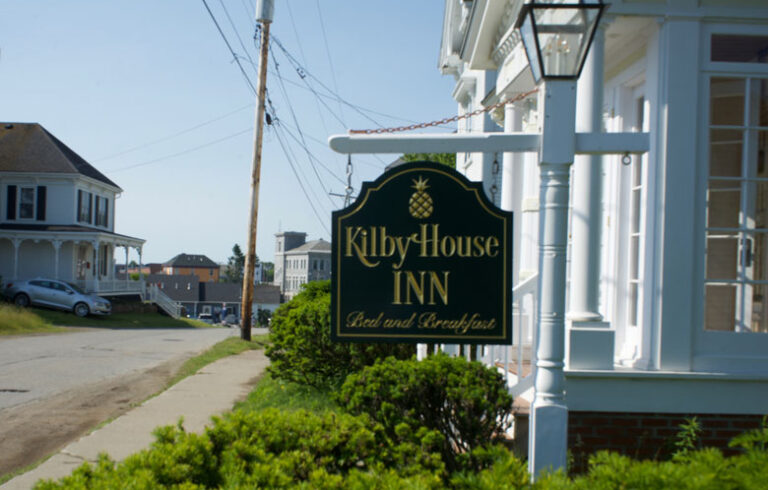Portland voters will cast ballots this fall on a slew of referendum questions that include proposals to reduce the number of short-term rentals, prohibit large cruise ships from coming to port, and increase the city’s minimum wage.
These are some of the very same issues that many coastal and island communities are grappling with now, or may have to contend with in the future, as they make decisions that chart their future course. Like Portland, a growing number of towns are dealing with a proliferation of short-term rentals—think Airbnb—and debating how best to regulate them. And like Portland, there’s growing sentiment in Bar Harbor that limits might be needed for cruise ships.
“There could be an absolute change in the character and heritage of these towns.”
—Herb Adams
Herb Adams, a Maine historian who lives in Portland, said coastal towns should pay attention to Portland’s referendums and what the voters decide. A longtime Portland resident, he has watched as parts of Portland have transformed from gritty workingman’s neighborhoods to ones with million-dollar condos.
Already, he said, many communities from the New Hampshire border to Downeast are “under challenge” as they become “discovered” by out-of-staters who like what they see.
“There could be an absolute change in the character and heritage of these towns,” he said.
In Portland, residents will vote on five citizen-initiated referendums that aim to limit the number of short-term rentals; prohibit corporate and absentee owners from operating short-term rentals; give tenants added protections; raise the minimum wage; and limit the number of passengers who can disembark from cruise ships to 1,000 a day.
Referendum supporters say the initiatives aim to make Portland a livable and environmentally sustainable city for residents and businesses alike, “not only for the 1%, not only for the tourists,” said Wes Pelletier of the Maine chapter of the Democratic Socialists of America, which placed four of the referendums on the ballot. “There’s a lot of appetite for this because change is needed,”
Opponents say the measures could harm small businesses, discourage investments in affordable housing developments, and create added bureaucracy.
A quick search on Airbnb and Vrbo comes up with listings for short-term rentals … with some renting for more than $1,000 a night.
“Right now, these referendums are causing everyone a great deal of uncertainty,” said Quincy Hentzel, president and CEO of the Portland Regional Chamber of Commerce. “And if these referendums pass, they will only increase costs on everyone in Portland, most certainly on small businesses. From dramatically increasing the minimum wage, to preventing cruise ships and thereby limiting dollars spent by visitors in our city, to instituting changes that make affordable housing harder and harder to come by—these referendums will harm the very individuals they claim to help.”
A growing number of coastal communities have passed or debated the need for new regulations governing short-term rentals in recent years as thousands of Mainers have started renting properties through popular online rental platforms. A quick search on Airbnb and Vrbo comes up with hundreds of listings for short-term rentals in homes, apartments, condos, guest houses, single rooms, and oceanside estates, with some renting for more than $1,000 a night.
Supporters of new regulations say the mushrooming of short-term rentals has driven up housing costs, contributed to Maine’s housing shortage by converting long-term housing into short-term rentals, and created nuisances in quiet neighborhoods. Others say short-term rentals generate tax revenue and attract tourists who support local economies, and that new regulations can infringe on property rights.
Many towns have passed various forms of local rules, while others are weighing what is best for them. In Stonington, for instance, town officials this summer said they are considering a moratorium to stop conversion of downtown waterfront commercial buildings into residences because of fears that short-term vacation rentals could take over the town’s commercial center.
In Portland, some Peaks Island property owners are speaking out against the November referendum, saying they would no longer be able to rent their seasonal properties to help pay for taxes and maintenance. If they are forced to sell, they say only rich people will be able to afford to own properties on Peaks. Others, however, say the referendum would lead to more affordable and long-term housing on the island.
PROCESS AND POLICY
The Portland referendums are also raising questions on how best to establish policies that will play a role in shaping the future direction of Maine’s largest city. Should those policies be determined by elected officials who serve on the city council? Or by advocacy groups which develop referendum questions and gather the necessary 1,500 signatures to get them on the ballot?
“The referendum process is written into law because it’s a way for people to say this is something we want and it’s not something our elected representatives are giving us right now,” said Pelletier, of the Democratic Socialists of America.
Others bristle at the thought that the city council is being bypassed through the referendum process.
Governing by referendum can result in confusing referenda wording and voters who are only partially informed on issues, said Greg Dugal, director of government affairs for Hospitality Maine, a trade group that represents the restaurant and lodging industries and opposes the Portland referendums.
“Portland’s become referendum crazy,” he said. “We certainly don’t believe 1,500 signatures is adequate to be able to put something on the ballot. We don’t believe that everything in Portland should be executed by referendum. That’s why the city council was elected, to be able execute these complex issues that we’re talking about.”
But it’s not just Portland. In Bar Harbor, the town council voted this summer to place daily and monthly passenger caps on cruise ship visitors. Residents will have a final say on a referendum in November proposing to allow no more than 1,000 people to disembark from cruise ships per day.
Mainers have had a constitutional right since 1908 to place referendums on ballots. If the Maine chapter of the Democratic Socialists of America has a say, more towns and cities could have local referendums in the future on issues such as short-term rentals, wages, and tenant’s rights.
“We are doing these things with an eye on seeing how we can do this on a statewide or regional level and create a template that makes it so the working-class people can afford to live,” Pelletier said. “No matter where in Maine they live.”
Portland’s referendum ballot
Portland residents will vote on five referendums on Nov. 8.
• An Act to Eliminate the Sub-Minimum Wage, Increase Minimum Wages and Strengthen Protections for Workers: Raise the city’s minimum wage in steps to $18 an hour beginning in 2025; eliminate the “sub-minimum wage” for tipped workers, such as restaurant servers and others who earn tips in addition to an hourly wage; create a Department of Fair Labor Practices to enforce the law.
• An Act to Reduce the Number of Short Term Rentals in Portland: Restrict short-term rentals to only those that are owner-occupied, tenant-occupied or located in two-unit buildings occupied by the owner.
• An Act to Regulate Short Term Rentals in Portland and Prohibit Absentee and Corporate Operation of Short Term Rental Properties: Prohibit corporate and absentee owners from operating short-term rental units; prohibit the eviction of tenants to immediately convert housing to a short-term rental.
• An Act to Restrict Cruise Ships in Order to Reduce Congestion and Pollution: Limit the number of passengers who can disembark from cruise ships to 1,000 per day, beginning in 2025.
• An Act to Protect Tenants in Portland: Prohibit application fees for rental properties; restrict deposits to one month’s rent; limit the standard amount of annual rent increases that are allowed to 70 percent of the change in the consumer price index.





